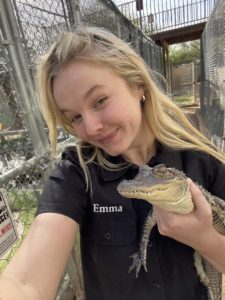Student Focus Post by Emma Goethe — Global Locust Initiatve
Emma is a Master of Sustainability Solutions (MSUS) student in the School of Sustainability and College of Global Futures. She also received a Bachelor of Arts degree in Sustainability in May 2021. During her undergraduate career, she defended her thesis through Barrett the Honors College titled “Inspiring Young Learners through Sustainability and Reptile Conservation Education.” Throughout her graduate program she, along with her group members, worked on their culminating experience project covering fair labor practices in procurement at ASU.
Q: When did you know you were interested in sustainability science?
Growing up I would make mini-documentaries illustrating my “wild” adventures in the iconic Sonoran Desert, in reality, it was just the wash behind my house, yet from then on, I knew I was fascinated by the natural world. This passion carried over into my college career, when I received a Bachelor of Arts degree in Sustainability and now my Master’s degree. Sustainability is fascinating as it strives to solve wicked problems that span disciples, boundaries, governments, cultures, and so on. In this sense I never had to be tied down to one area of study, instead, I could learn about the abundance of topics that exist within sustainability.
Q: When did you become interested in the GLI?
In order to become the well-rounded sustainability professional I wanted to be, I was thrilled when I was first introduced to the Global Locust Initiative (GLI) through ASU’s Sustainability Undergraduate Research Experiences (SURE). I have had the pleasure of working with Joseph Gazing Wolf, who acted as my mentor, on a number of these projects.
Q: Can you tell us about some of the projects you worked on for the GLI?
National Science Foundation Faculty Early Career Development Program (CAREER)
This grant, led by Dr. Arianne Cease, Director of the GLI, looks at the physiological trade-offs of locust migration with reproduction and immune function. It examines how nutritional quality and population density interact with these trade-offs. My primary role was to assist with locust care, such as replenishing the sand cups, adding more hydration to them midweek, and preparing the lettuce. Finally, I helped by meticulously sorting and counting hundreds of locust eggs using forceps. This was a long and tedious process but I can guarantee I will win every game of Operation for the rest of my life.
Locust Wing Expansion Collaboration with Virginia Tech
In October 2021 the Socha Lab from Virginia Tech came to ASU to work on a collaborative research study with the Global Locust Initiative. This experiment focuses on different stages of wing development after the molting process. Currently, the group is continuing to work towards publication while continuing data analysis.
Pinned Hopper Collection
I worked on making a hopper collection for the varying species we have within the lab. The hoppers will be in display boxes to illustrate different species and time stamps which could be relevant to refer to when looking at older studies.
Traditional Buffalo Herd Health and Management
We are publishing a paper discussing the historical and cultural significance of the North American Buffalo for Indigenous communities, the traditional means of herd management and herd health, and Joseph Gazing Wolf's personal experiences as a Lakota buffalo rancher. I have assisted by creating an outline, finding relevant literature, and beginning the first draft of the paper.
Prairie Dog Effect on Soil Composition
Prairie dogs play an integral part in ensuring soil health in the Thunder Basin ecoregion in northeast Wyoming, among other prairie ecoregions. This study can help illustrate prairie dogs' short and long-term effects on soil due to their experienced plague events. My role was to help transfer field data to Excel and R and create a summary of the data, conduct a comparative literature search to distinguish the unique contributions of prairie dogs to soil composition, and begin the outline intended for the paper illustrating the information found. This work is conducted under the guidance of Joseph Gazing Wolf.
Q: We heard you have some exciting opportunities coming up after graduation. Will you tell us about them?
After graduating in May 2022 with a Master’s of Sustainability Solutions, I will be moving to Florida to work with Disney’s Animal, Science, and Environment team as a conservation educator. I will have an abundance of conservation-related curriculum that I will be teaching to the guests at Disney Animal Kingdom. This opportunity will provide me with a wonderful leeway into a long-lasting career in conservation and sustainability.
